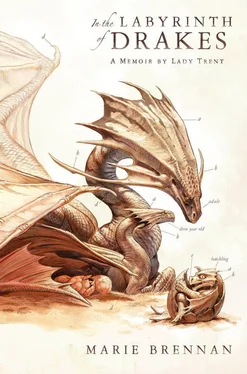I was not the only one thinking of Rahuahane. His voice almost as dry as the air, Tom said, “This beats that other ruin you found all hollow.”
And then Suhail said, “This is wrong.”
It brought us all around to stare at him. “What?” Andrew said.
Suhail’s free hand curled in the empty air, as if to grasp a mirage. “Rahuahane. Can you not see ?”
I cannot fault the other two for failing to grasp his point. They had not been on that cursed island; they did not know the conversation we had there. But I looked once more at the statues in the corner, and I understood. “These are the figures you told me about—the fertility gods, or guardians of the young. Whichever they are. The ones we found at that hatching ground.”
Now Andrew was staring at me instead of at Suhail. “Hatching ground? Rahooa-what? When did you find a ruin?”
I had shared many things with my brother, but not that. He was too likely to tell someone, or go haring off to the Broken Sea to find it for himself—and that was without me telling him about the firestone. But I could not spare the attention to explain it to him right then. “This has all the marks of a hatching ground, for the dragons the Draconeans bred. But where is the hatching ground itself?”
With that question in mind, the site’s purpose became obvious. Even if one were not a specialist like Suhail, familiar with theories about the particular variety of statue looming over us from the four corners, the murals told the tale. The processions of people were not merely bearing offerings; they bore them to gods who stood over radiant spheres—eggs. I could not understand all the symbolism, but I did not need to. There ought to be eggs here, and there were not.
The room was not so terribly large that a pit for eggs could have somehow escaped our notice. Tom even went to the bodies fallen in the corner and peered under them, on the small chance that they concealed anything of interest. The bowl that had stood atop the tripod was not nearly sufficient to hold such a burden. “Unless there was only one egg at a time?” Suhail suggested doubtfully.
But the inside of the bowl was charred, indicating they had lit fires inside it. “Even desert drake eggs do not incubate in flame,” I said. “Likely they burnt offerings or incense here.”
A muscle jumped in Suhail’s jaw. “I should not be frustrated,” he said, with a disbelieving laugh. “On Rahuahane we made the discovery of a lifetime; here we have made the discovery of the century. To be so lucky twice is a gift from God himself. But—it feels incomplete. I am certain there should be more.”
Andrew spun in a circle, arms flung outward. He was grinning like a fool. “Al-Sindi! In the stories, there’s always a secret door.”
“You,” I said severely, “have been reading too many fairy tales.”
Then we all fell silent, looking at one another. Tom offered, with a cautious air, “The walls—they’re scarred in places.”
So they were. Chips of stone had broken off the carvings, and not in the places one might expect from a fight. I looked around the room again, this time thinking less about the walls, more about what had taken place within them. “These men break in. Are the defenders here when they come, or do they surprise the invaders in their work?”
“They’re here,” Andrew said immediately. “The way the fellow out there fell—he was facing someone farther down the corridor, not fighting against someone coming in.” He paced a circuit, shining his light on stains and scattered piles of decayed cloth. “There’s more blood here than just those two could account for. Maybe some of the defenders died, too. If so, their bodies were taken away later.”
Tom took Suhail’s lamp and examined a section of scarred mural. “After the invaders left, I’m guessing. Somebody hacked at the walls for a while. Not in any systematic way, I don’t think—it looks more like frustration at work. If we pretend for a moment that there is a door here somewhere… they might have lost their tempers when they failed to find it.”
“Is it even possible ?” I said.
“A secret door?” The grin spreading across Suhail’s face would not have looked out of place on an eight-year-old boy. “Yes. It would have to be—” He whirled, gazing upward, orienting himself relative to the plateau above. “This direction.” He pointed at the wall that held the entrance to the corridor. “Unless it is underneath us entirely. There is no space for it in the other direction, and if it were to the left or right, it would have to be very small.”
We had tramped up and down from that plateau often enough to all have a very good sense of its dimensions. “Or else another corridor,” I said. “It would almost have to be a corridor, or else an exceedingly small room; otherwise it would overlap with the path we came in by. But how on earth would it open?”
Andrew actually bounced in place, so great was his excitement. “Some kind of hidden lever or knob! But we should be careful; we might trigger a trap instead. Then poison darts will come shooting out of the walls, or the ceiling will drop on us—”
Suhail laughed. “I think we can rest safe on that count. There has never been any proof that the Draconeans built traps into their sites.”
“There’s never been anything like this, either,” Andrew said—which was true, albeit not a very compelling argument for improbable traps.
Given the room’s intricately carved decoration, though, finding the trigger for a secret door (always supposing one existed in the first place) would be easier said than done. The invaders seemed to have tried without success; what were the odds that we would do any better? In our favour, we did have more time to search than they likely had, if there had been a rebellion under way at the time. But we could not press and pull on every square centimeter of the walls.
When the first hour of random prodding failed to produce any results, however, that was precisely what Suhail proposed. “We have to be systematic,” he said. “Otherwise we will waste our effort, revisiting points we have already tried, and perhaps miss the bit we need by a mere finger’s breadth.”
Just then we heard a startled Akhian oath from the corridor. It was Haidar, come to make certain we had not all perished; instead he had found the first body. The hour was getting late, though it hardly made any difference in the depths of the temple. “We’ll come back to this tomorrow,” Tom said. “It’s waited for millennia; if there’s anything else for us to find, it can wait a few hours more.”
Andrew and Suhail both made faces like their mothers were telling them to leave off playing and come have a bath. I believe I controlled my expression better, though not my heart. But with my concentration broken, I found myself ravenous, and Tom had a point.
“First thing tomorrow,” I agreed. “And I shall not sleep a wink tonight.”
* * *
Upon our return the next morning, I did not take part in the Great Secret Door Search. Instead I brought my sketchbook with me, along with every lamp we had, and set to work documenting the interior of the temple.
Nowadays this sort of thing is done with photography, and had we known we were going to stumble upon a priceless Draconean ruin, we would have brought a camera with us. (A camera, and someone to work it: none of us knew how to operate such a thing.) But the photographic methods of the time, being quite new, had one great flaw, which was that they required very long exposures—hardly ideal for capturing living subjects like dragons, who have no interest in sitting for their portraits. We might have gotten some value out of photographing them asleep, or recording their habitat; but I could do the same with pencils and paper, and those are much less finicky about temperature and the interference of grit. A camera was far more trouble than it truly would have been worth… or so we had assumed.
Читать дальше












